Roz Savage's Blog, page 27
June 16, 2016
The Courage to Change
I’m kicking off a new season of blog posts, on the subject of COURAGE. And I’d like to ask for your help. I’m embarking on a new book on this very subject, so I’m using these blogs to pilot my ideas. I’d love to get your feedback. Agree? Disagree? or “Yes, and…..”? Please tell me in the comments below!
“I must be willing to give up what I am in order to become what I will be.” – Einstein
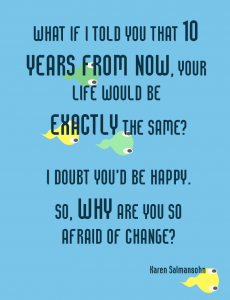 Change is hard. We all know that. If we’re overconfident, and tend to blame our circumstances rather than ourselves when things don’t go as we hoped, we might not accept that we need to change. And if we’re under-confident, and internalise blame, we might not fully believe that we are capable of change – if we try, and struggle, and fail, we might think to ourselves, “I’m useless – I’ve tried to change, and I can’t, and I never will”.
Change is hard. We all know that. If we’re overconfident, and tend to blame our circumstances rather than ourselves when things don’t go as we hoped, we might not accept that we need to change. And if we’re under-confident, and internalise blame, we might not fully believe that we are capable of change – if we try, and struggle, and fail, we might think to ourselves, “I’m useless – I’ve tried to change, and I can’t, and I never will”.
To change takes courage. A lot of it. And it takes different kinds of courage as we go through the process.
First, we need the courage to take a long hard look at what is happening in our lives, and take stock.
As Mark Twain said, “If you always do what you’ve always done, you’ll always get what you’ve always got”. So if what you keep on getting isn’t what you want, it’s time to get honest with yourself. Rather than wondering, “Why does this keep happening to me?”, try asking yourself, “Why do I keep creating this in my life?”. Take responsibility for it, and see how that changes things.
Second, we need the courage to commit to doing something differently, consistently over time, to see if we get a different result.
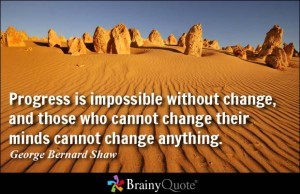 This is a leap of faith. It may not be clear that the struggle to develop new habits is going to be worthwhile in the way you expect. The consolation is that whatever results you get will give you information. If you’re genuinely doing something differently, your results will be different – I promise you – and if they’re not the right kind of different, then reassess and try something else. The important part here is to commit to making the change, and follow through with it. Wholehearted commitment is the only effective option – nothing less will do. Which isn’t to say that you’ll never screw up. But when you do, get back on the horse and carry on riding.
This is a leap of faith. It may not be clear that the struggle to develop new habits is going to be worthwhile in the way you expect. The consolation is that whatever results you get will give you information. If you’re genuinely doing something differently, your results will be different – I promise you – and if they’re not the right kind of different, then reassess and try something else. The important part here is to commit to making the change, and follow through with it. Wholehearted commitment is the only effective option – nothing less will do. Which isn’t to say that you’ll never screw up. But when you do, get back on the horse and carry on riding.
Third, we need to be prepared for other people to not like the new version of ourselves.
They might be very comfortable with us being not too successful, or overweight, or addicted to doomed relationships. Maybe it reassures them that they are not the most inadequate person on the block. If you change, they may feel pricklings of guilt and envy because they don’t have as much courage as you do. This can be hard. They may well try to drag you back into the old you – “go on, just one cookie won’t hurt”. And if you love them, you may well feel bad that you’ve made them feel uncomfortable. Your urge to comply with their low expectations of you may be strong. But whose life is it? If you’re really committed to living your best life, hold steady. If they don’t love you enough to support your personal growth, you may want to reconsider whether they are someone you want to be around.
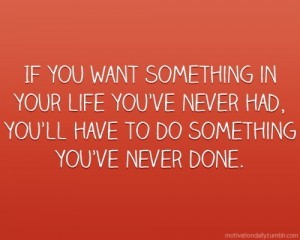 Central to this is the idea of you taking ownership of the change.
Central to this is the idea of you taking ownership of the change.
You’re not trying to change your boss, or your spouse, or your children. You’re welcome to try, but trying to fix other people rarely works, and more usually leads to enormous frustration. You’re not even looking at what you can do about a challenging situation. You are looking at how you can be with it. To that end, I would tweak what Mark Twain said, to “If you carry on being who you’ve always been, you’ll always get what you’ve always got”.
So change.
That might sound hard. You might feel like you’ve always been the same person, and always will be, but trust me, you’re changing. If you look back to who you were at 10 years old, 20, 30, 40, 50, you can see that you have changed over time. Mostly, we are not conscious of how we are changing, because we spend all day, every day with ourselves. If you’ve ever gained (or lost, if you’re lucky) weight very gradually, you’ll know that the difference might be imperceptible to you until you run into someone you haven’t seen in a long while and you see the surprise on their face.
So we’re changing anyway.
Living a conscious life means making conscious changes – those incremental changes that, over time, add up to a dramatic transformation that is no less radical for having happened little by little, like a river carving a canyon or a stalactite forming in a cave.
Exercise:
 1. The next time you catch yourself thinking, “Why does this keep happening to me?”, stop for a moment. Make a mental note.
1. The next time you catch yourself thinking, “Why does this keep happening to me?”, stop for a moment. Make a mental note.
2. Now, change your attitude towards it. What if this recurring thing wasn’t happening to you, but rather happening for you? If your life were a gentle but persistent teacher that insisted on giving you this one lesson over and over until you got the message, what might that that message be?
3. What might the obstacles be to you taking that lesson on board? Who will be affected? How? What might make it difficult for you to make this change? Come up with a strategy. Figure out ways to overcome those obstacles. Plan ahead to make it as easy as possible for you to change in the ways you want to change.
4. Experiment with your theory. Try doing things a bit differently for a while. You don’t have to go in with all guns blazing in an act of radical personal transformation – although you can, of course. Up to you. But equally it can be a quiet (r)evolution, starting gently, with the “minimum viable response” approach. In other words, from a place of inner strength and serenity and self-containment, subtly modify the way you operate in the world and see if you start getting different results. If you do, are those results better or worse than what you got before? If they’re better, are they better enough? Adjust your strategy as you go, but always from that core of inner strength and serenity and self-containment.
June 9, 2016
Always Look On The Bright Side Of Life
To round off my series of lessons learned on the ocean (which started on February 11th with The Retrospective Perspective) , we’re ending on a lighter note.
I had a special playlist for extreme emergencies, and it consisted of just one song: Always Look On The Bright Side Of Life, from Monty Python’s film, Life of Brian.
(You will notice that, towards the end, Eric Idle is heard to say, “Worse things happen at sea” – well, to be sure, a lot of bad things do happen at sea, but there aren’t really all that many things worse than crucifixion…)
Sometimes I have a tendency to take life – and myself – too seriously. But no matter what I’m going through, this song never fails to raise a smile. It might strike some as irreligious, but I hope you’ll enjoy it for what it is meant to be – a daft, silly song, with a reminder that everything passes eventually, and there is always a bright side to be found if you’re willing to look hard enough.
Other Stuff:
Sadly my lovely American rowers, James and Cindy, are having to chew on life’s gristle at the moment. Shortly after setting out from Scituate, Massachusetts, their boat started leaking, and their VHF radio stopped working. So yesterday they wisely decided to request a tow back to shore so they can fix the problems. Keep an eye on their website for further updates.
In the Great Pacific Race, the proud owners of my old boat, Sedna, Fight the Kraken, are going well. I’m also following the Sons of the Pacific, comprising Louis Bird, who is the son of ocean rowing legend Peter Bird, and his 11th-hour substitute crewmate, Erden Eruç, who was the first person to row solo across three oceans, beating me to the title by 12 months.
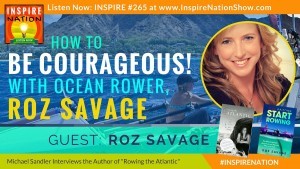 I was delighted to be a guest on Michael Sandler’s top-rated Inspire Nation podcast. You can listen to our conversation here.
I was delighted to be a guest on Michael Sandler’s top-rated Inspire Nation podcast. You can listen to our conversation here.
Wishing you a slightly belated Happy World Oceans Day! I took part in two Google Hangouts yesterday, one with Exploring By The Seat Of Your Pants, with classrooms from Canada and the US calling in, and the second with be Waste Wise, hosted by Ranjith Annepu, and featuring Dianna Cohen of Plastic Pollution Coalition, Marcus Erikson of the 5 Gyres Institute, and Sourabh Kaushal, expert on space debris. Unfortunately I had hideous internet problems, so my contributions are rather intermittent, but you’ll really enjoy hearing the perspectives offered by the others. The video recording is available here.
Starting next week, a new blog series on aspects of courage….
May 14, 2014
Farewell for now…..
And so we reach (at least temporarily) the end of a chapter.
Vic and I have had enormous fun over the last 9 months doing the Adventure Podcast. I am immensely proud of what we have achieved, and delighted to have shared this journey with you. But now it is time for us to take a break.
Vic has a super-hectic summer, acting as shore agent for 80 ships coming through Kristiansand between now and October.
And I am also busy, getting a new business off the ground, which is going to take up all my time and energy. I love to do things wholeheartedly, and so I am (so to speak) clearing the decks to allow me to focus on this new project.
So we took the tough, but correct, decision to take a break from the Adventure Podcast – hopefully not forever, but certainly for now.
We would like to say a huge thank you to the wonderful guests who have shared their time with us, and who have made me (at the very least) consider anew what is possible.
And also to you, our beloved listeners, who have shared your appreciation of our guests and have written in to share your own perspectives – and sometimes even ended up as guests on our show.
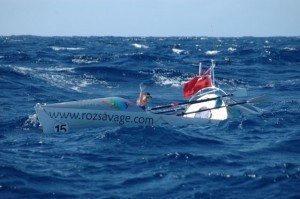
Farewell for now
And on a personal note, I would like to thank Producer Vic for doing such an amazing job, being there as the strong but silent tower of strength behind this podcast. You mostly won’t have been aware of his contribution, but this podcast could not have happened without his unwavering support.
As so many adventurers who over the years have faced a temporary parting of the ways, I hope that absence will make the heart grow fonder, rather than out of sight and out of mind.
Hasta luego, amigos!
Here is our farewell-for-now message…..
And to make sure you don’t miss out on future episodes once we return, please subscribe to the show via RSS or iTunes, please click on the appropriate button below.
Au revoir!
May 7, 2014
Adventure Podcast #34: Jamie Buchanan-Dunlop, Digital Explorer
Jamie Buchanan-Dunlop began his career as a teacher and spent five years teaching 11-18 year-olds at Eastbury Comprehensive, before developing multimedia approaches to learning at London’s largest comprehensive, Crown Woods School.
He finished teaching to become an entrepreneur – he set up Digital Explorer, an award-winning social enterprise that engages young people with global issues by using the latest communications technology on educational expeditions to allow them to access expedition data on a real time basis. He has done all kinds of exciting things – like organising chats with schools from the Great Barrier Reef, promoting knowledge about Pakistan, and conducting scientific research in the Arctic.
For the love of nature
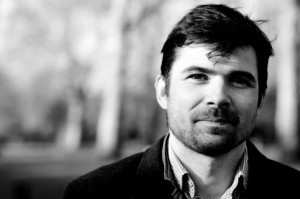
Jamie Buchanan-Dunlop
“We build our future not through the fear of what we are going to lose, but the love of what we have.” (Jamie at WOW Talks)
I blush when I think of how wrong I’ve sometimes got it when I’ve tried to get people to think differently about our environment. When I’m really passionate about something – and I am passionate about the environment – I can fall into the trap of focusing on what I want to say, instead of what people want to hear – and at its worst this can come across as boring, abrasive, and/or preachy.
But, you might be thinking, don’t people sometimes need to face an inconvenient truth rather than a convenient lie? Don’t we need to tell the truth, and face up to harsh reality?
Well, yes and no. There is a fine balance to be struck here. Sometimes we only appreciate how much we love something when we are faced with its imminent loss. But if we overdo the gloom and doom, the danger is that we drive people into defensiveness or despair – defensiveness if they feel guilty for past sins against nature, or despair if they have done their best to live green but don’t see any results from their endeavours. And both of those attitudes are inimical to action.
So a softer approach can be much more effective, doing what Jamie does through Digital Explorer, getting people out into nature to get to know it better, and sharing their journeys of discovery with others so that we can all get to know and love our world.
“When we travel with our hearts and our eyes open, something shifts within us on a more fundamental level.” (Jamie)
To subscribe to the show via RSS or iTunes, please click on the appropriate button below.
Show Notes
Thank you to our sponsors, Audible.com, and our book for this week comes highly recommended by Producer Vic: The Martian, by Andy Weir. To claim your free audiobook, please follow our Adventure Podcast affiliate link. I have to say that this book sounds SO good I might have to buy it myself!!
(Note: this week I’ve dropped giving the time stamps for various points in the conversation. If you desperately miss them, let me know and I can bring them back.)
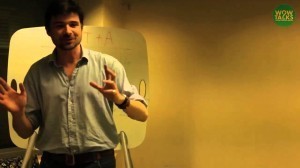
Jamie at WOW
Exploring Scotland as a child
How a rugby injury led to a life of adventure
Falling in love with the geography, people, and culture of the Himalayas
Jamie’s favourite parts of the world
Digital Explorer – bringing the world to a classroom near you
Jamie’s top bits of gear
The challenges of expedition technology
Travel as transformation
Google Earth – an invaluable tool
Links
May 1, 2014
Adventure Podcast #33: Pete Goss, Sailor and Begetter of Daft Ideas
A former Royal Marine, Pete has been in and out of the headlines since the late 80s, when he sailed a tiny 26-foot catamaran across the Atlantic to take second in class against many bigger boats.
But it was in 1996 that he really hit the news big time when he was competing in the Vendee Globe single-handed around-the-world yacht race and famously turned around to go and rescue a fellow competitor – and a Frenchman at that – who had had to abandon ship in the Southern Ocean – a place you really don’t want to be bobbing around in a liferaft.
Pete is a serial adventurer, who modestly describes himself as not having a career, but rather a series of daft ideas, that he then makes happen.
When is a daft idea not a daft idea?
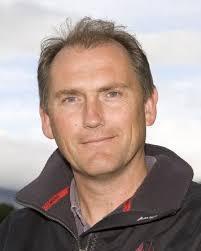
Pete Goss
When you make it happen.
And while riffing on this theme, I should emphasise that as per usual this blog post solely represents the views of the blogger (that’s me) and in no way represents the views of our distinguished guest.
“If at first, the idea is not absurd, then there is no hope for it.” (Albert Einstein)
Where would the history of human endeavour be without a long and distinguished history of daft ideas? Put yourself in the shoes of the first person to wonder:
“Would the liquid that comes out of a cow’s udder be good to drink?”
“I’m going to roll up some dried leaves in a piece of paper and set it on fire and put it in my mouth.” (I love this hilarious classic comedy sketch – Bob Newhart on Nutty Walt, aka Sir Walter Raleigh.)
“I’m going to show this person that I love them by swapping spit with them.” (Yes, I know it’s to check out their pheromones, but it’s still pretty odd when you think about it. And let’s not even talk about sex.)
And in a more adventurous vein….
“So I’m going to get in this ship and set out towards the sunset with no maps and no GPS and just keep going until I bump into land. Surely I’ll run into something sooner or later.”
“There’s this really inhospitable, freezing cold place at the top/bottom of the world, with nothing there except lots of ice and snow. I want to go there.”
“There’s an incredibly dangerous mountain/river/ocean with incredibly high odds that I’ll never make it back alive. Hell, yeah!”
And then some things just really are daft….
- making “disposable” items out of indestructible plastic
- working ourselves into an early grave to acquire stuff that we don’t need
- loving stuff and using people, instead of using stuff and loving people.
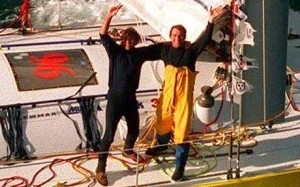
Pete Goss with Raphael Dinelli
So what differentiates good “daft” from just daft “daft”? How about this?
Do-able, yet challenging
Advancing human knowledge and understanding
For a greater purpose
Torturously (almost inevitably)
“Only those who will risk going too far can possibly find out how far one can go.” (T. S. Eliot)
To subscribe to the show via RSS or iTunes, please click on the appropriate button below.
Show Notes

Team Philips
A thank you to our sponsors, Audible.com, and Pete’s book recommendation: To Kill A Mockingbird. To claim your free audiobook, please follow the Adventure Podcast affiliate link. (But… I’m shocked and surprised. Out of Audible.com’s amazing 150,000 books, To Kill A Mockingbird is not available. Sorry! The link will take you to Amazon.com.)
2:40 Winning the lottery of life – hearing about Pete’s parents
4:50 Training a team for the British Steel Challenge
10:45 Choosing the team according to the goal
13:45 A series of daft ideas
16:00 Saving Raphael Dinelli’s life in the Vendee Globe
21:40 A proposal at sea
23:15 Team Philips, and losing the world’s biggest catamaran – oops!
30:40 The Spirit of Mystery
35:00 The definition of adventure is that it has an unknown outcome – but how to reconcile this with family life?
39:40 Paying it forward – Pete’s children also winning the lottery of life!
Links
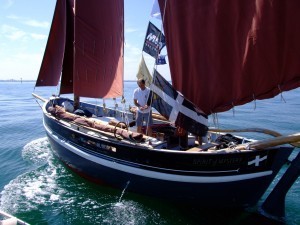
The Spirit of Mystery
April 24, 2014
Adventure Podcast #32: Anthony Manrique and Emma Stevens, Adventuring Without Money
After nearly three years of planning, in September 2012 Anthony Manrique and Emma Stevens set out on a big adventure. The plan was to take a roundabout route to Colombia, via France, Spain, Portugal, the Canaries and the Atlantic Ocean.
They have now been on the road for over 18 months, despite having run out of money in Colombia just over a year ago. They have not let that minor detail stop them – which we discuss in fascinating detail in this week’s podcast.
Money makes the world go round?
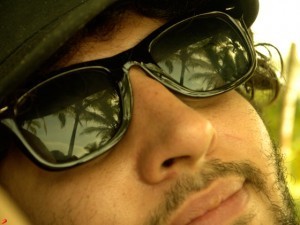
Anthony Manrique
“Have faith in other people because they just want to help. One of the most beautiful things you can do is to put yourself in an uncertain situation and allow people to access their innate kindness because when you see the joy that people get from sharing and helping – it’s wonderful.” (Anthony Manrique)
How would most of us feel if we were in a foreign country with absolutely no money, not even enough to get home?
Scared?
Vulnerable?
Maybe even a failure?
But as with so many things, it’s not the situation that matters – it’s our response to the situation. While most of us might have been freaked out by the idea of running out of money, Anthony and Emma were ready for it.
What I took away from my mind-expanding conversation with them was:
The concept of life without money is easier to grasp if you’ve seen other people (their Hungarian friends) do it and not just survive, but thrive.
Knowing that someone has gone 11 days without food makes it a lot less bad to go hungry for a mere 2 days.
Exchanging hard work for board and lodging (and a lot of learning) makes everybody a winner.
As we’ve heard so many times before on this podcast, most human beings love to help. If you recall the story of the Good Samaritan, it seems less surprising that the Samaritan stopped to help, and more surprising that the first two miserable bastards crossed the road to avoid the injured man. When adventurers go out into the world with humility and vulnerability, people respond with kindness and generosity.
Both giving and receiving trigger happiness responses in human beings, as a reward for our interconnection and interdependence – an evolutionary response that we needed for survival.
Maybe money even gets in the way of our better natures. Psychologists seem to have proof that this is so. There’s a great video here (with transcription) about how people with more money are less likely than poorer people to stop for a pedestrian at a crossing, and more likely to cheat, lie, and steal candy from children. Seriously, I’m not making this up! Also psychologist Paul Piff’s TED Talk: Does Money Make You Mean?
So… does money really make the world go round?
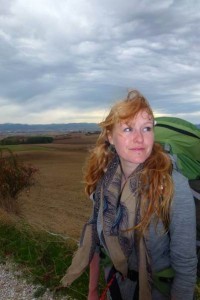
Emma Stevens
Other great quotes from Anthony and Emma’s Uncertainties blog:
“Travel, exploration and adventure should be an expression of the sacred relationship between humankind and nature. A celebration of our connection with, reliance upon and duty to planet Earth.”
“From the struggle we find that we are in fact inextricably linked to these places. We have poured blood, sweat, tears, vomit and diarrhoea onto them. And in turn they have poured something into us; something that immediately validates the difficulty, even if we don’t yet know it.”
“Without uncertainty there is no hope and adventure fades simply to motion.”
To subscribe to the show via RSS or iTunes, please click on the appropriate button below.
Show Notes
A thank you to our sponsors, Audible.com, and Vic’s book recommendation, The Alchemy of Air by Thomas Hager. To claim your free audiobook, please follow the Adventure Podcast affiliate link.
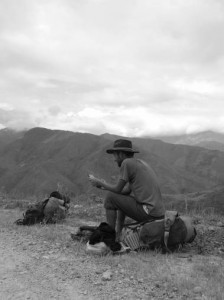
Anthony in Peru
1:40 Our first ever podcast recorded from a Colombian loo
2:55 Life before adventure
4:55 The journey prior to LWM (Life Without Money)
7:00 Their first encounters with PWM (People Without Money)
10:30 Role models for LWM, e.g. Mark Boyle, the Moneyless Man (note: Anthony emailed me after our conversation to point out that Mark is now living with money again, although still adhering to his philosophy of simplicity and continuing to live and participate within gift economies)
11:50 Starting out on LWM
13:45 Maintaining a moneyless lifestyle
15:15 Evidence that the people who have the least, give the most
15:45 Adjusting attitudes to hunger
17:30 Embracing uncertainty, allowing people to be generous
20:00 Paying it forwards, the circular economy of kindness
20:40 Does moneyless travelling work all over the world?

Emma and friends
23:00 Misrepresentation of human nature in the media
23:30 The environmental benefits of LWM
25:00 Planning to pass on their skills
26:40 Offering work as gift
27:40 Crossing back across the Atlantic
30:45 Top tips for travelling with little or no money
33:00 Slacklining for meditation and making friends
34:40 The healing power of nature
37:00 The importance of bringing back the lessons learned – “Don’t let go of what you learned, otherwise it’s not a lesson”
38:00 Staying in touch
Links
The Uncertainties blog - with loads of stunning photos guaranteed to induce wanderlust
And one of my favourite blog posts: Why the Hell am I Doing This?
Anthony and Emma’s Helpx page, advertising their services in exchange for board and lodging
WWOOF International for jobs on organic farms around the world
Sacred Economics by Charles Eisenstein
Crowdfund your adventure at Trevolta.com and meanwhile PLEASE chip in and help fund Anthony and Emma’s trip home! (food costs only)
April 17, 2014
Adventure Podcast #31: Nick Jaffe, Solo Ocean Sailor
From 2006-2009 Nick Jaffe sailed a 26-foot sailboat from Europe to Australia, via the Atlantic ocean, Rocky Mountains & Pacific, a total of 743 days – not letting a few minor details get in the way of his plans, like the fact that he had no money, and didn’t know how to sail. He did it – mostly – solo. Last year he sailed from San Francisco to Sydney in his boat Harmony.
His website says he is interested in independent small business, meaningful living, decentralisation, freedom, non-corporatism, transparency, community oriented economies, creativity, solo sailing, the ocean, risk, and wildness.
Nick and I have been in touch since 2010, and he kindly hosts my website on his Serversaurus servers. If you look at their website you’ll see that they will plant a tree for every like and follow they get, which says a lot about the way Nick does business. He also created an earlier website for me, and I used a special app he had created to allow me to send Tweets from the Pacific – it’s surprisingly complicated to post Tweets from the ocean – and his Nomaddica app that allowed supporters to sponsor a mile of my Indian Ocean crossing. Nick has always been an absolute pleasure to work with, so I was delighted to welcome him to the Adventure Podcast.
Ocean Freedom
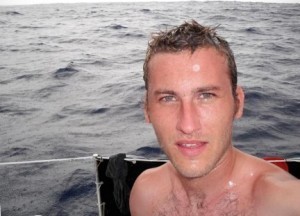
Nick – no beard…..
“The ocean is the last bastion of human freedom.” (Nick Jaffe)
In the era of Edward Snowden and Big Data (or should that be Big Brother?), there is a growing number of people concerned that our every move is tracked – where we go, what we buy, who we email, who we call, and what websites we browse.
I am not sure whether the ocean attracts those who already rebel against authority and Big Brother-ism, or whether the ocean makes them so. I just know that the boating types that I have met include a higher-than-average percentage of those who prefer to escape authority’s ever-watchful eye.
The ocean demands a lot – tolerance, patience, courage, exceptional practicality and self-reliance – but what it gives in return is privacy, independence, and freedom from authority and observation.
Health and safety regulations seem utterly irrelevant at sea in a small boat. That is to say – health and safety are absolutely paramount, but the rules are set by Mother Nature, not by bureaucrats. Solo sailors (and rowers) are free to do whatever they want to do, bound only by respect for the forces of nature and their own survival instinct.
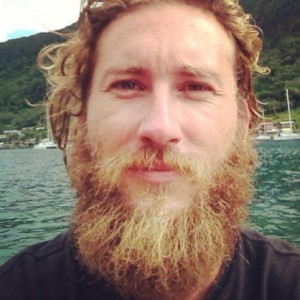
….and with beard!
Hence the following clause in the rules for the upcoming Great Pacific Rowing Race, starting 7th June from Monterey (to which I am Race Consultant):
“16.1 The Entrant acknowledges and agrees that ocean rowing is a dangerous sport and that he / she undertakes the Race at his / her own risk. There shall be no liability whatsoever upon the Race Organiser or any person in its employment (subject to any statutory requirement to the contrary) for death or any personal injury or financial loss directly or indirectly incurred by the Entrant by reason of the failure or foundering of a Boat or for any other reason.“
In other words, at sea you can be a hero or a damn fool – it is entirely up to you. But that freedom to act as you will is counterbalanced by the inevitability that you will reap the consequences of those actions.
Do we get the balance right? Freedom? Responsibility? Security? Privacy? What do you choose?
“We must seek out and identify structures of authority, hierarchy, and domination in every aspect of life, and to challenge them; unless a justification for them can be given, they are illegitimate, and should be dismantled, to increase the scope of human freedom.”
-Anarchism & Marxism (Noam Chomsky)
To subscribe to the show via RSS or iTunes, please click on the appropriate button below.
Show Notes
To claim your free audiobook, please follow the Adventure Podcast affiliate link. Producer Vic’s recommendation this week is Fear and Loathing in Las Vegas, by Hunter S Thompson.
0:30 Catching up with Nick
3:00 How it all started, hanging out with his dad
5:30 Deciding to sail around the world
7:30 Preparations
10:15 The importance of being naïve
12:00 The difference between dreamers and doers – how to make it out of the marina
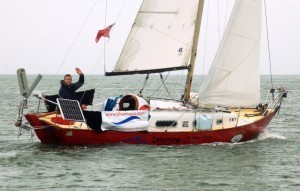
Arriving in San Francisco
14:50 A wobbly start
20:00 “Living life on the edge of luck” – did Nick ever feel at home on the ocean?
21:40 North America
25:15 Finance? Or freedom? The dilemma of sponsorship
30:00 Berkeley and beyond to Hawaii
32:30 The stowaway
36:00 Nick gets caught up in the tsunami
37:40 Arriving back in Australia
39:15 Filmmaking tips for the solo sailor
41:00 Entrepreneurship ashore – the Electron Workshop
42:30 Meaningful living
44:00 Selling Harmony
45:15 Staying in touch with Nick
Links
Between Home – the movie
April 9, 2014
Adventure Podcast #30: Greg Kolodziejzyk, Über-Endurance Athlete
Greg Kolodziejzyk is an incredible athlete from Canada, specialising in human-powered endurance events – and with a real passion to get us all off our backsides and out and doing more exercise. He certainly leads by example – he has completed 12 Ironman triathlons, two dozen marathons, qualified for Boston marathon, and 5 ultra marathons.
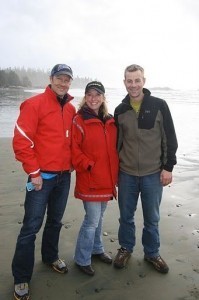
Me with Greg (left) and Colin Angus
He holds world records for longest distance traveled in 24 hours (records are with International Human Powered Vehicle Association):
- Sept 2008 – World record for the most distance traveled by human power on water – 154 miles
- July 2006 – World record for the most distance traveled by human power on land – 647 miles
I’ve been following Greg’s newsletter since 2007. Later that year he and his wife, Helen, were kind enough to let me stay in their lovely ski lodge in Whitefish, Montana. Greg also designed my cool Savage logo, which isn’t on my website just now, but is on my business cards, video closing credits, etc.
In 2010 I finally got to meet Greg when I was staying with Colin and Julie Angus on Vancouver Island, and Greg came over to test out his incredible pedal boat. A few weeks ago we chatted with Jason Lewis about his Moksha – Greg’s boat was similar in design, but a lot sleeker, and absolutely immaculate inside and out.
Greg was bidding to do the fastest crossing of the Pacific from Canada to Hawaii – and we’ll hear more about that in the podcast.
Athlete, or Adventurer?
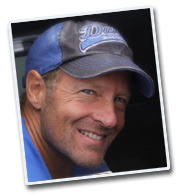
Greg Kolodziejzyk
“You need to think about what it really is that works for me, what kind of a guy I am. Where do I draw the line between adventure and an athletic goal?” (Greg Kolodziejzyk)
Greg Kolodziejzyk was faced with an incredibly tough decision. After countless months spent in the workshop, labouring on his sleek pedal-powered boat WiTHiN with the goal of pedalling her from Canada to Hawaii, something just wasn’t right. The sea trials off Vancouver Island had revealed some design issues with the boat’s self-righting capability. And Greg himself had suffered terribly from seasickness, which showed no signs of letting up no matter how long he spent on the water.
It wasn’t just a question of whether to continue, modify or abort the endeavour. It went deeper than that. It went to a question of identity.
Greg had already proved his exceptional talents as an endurance athlete, claiming world records for the longest distance travelled under human power within 24 hours on both land and water, as well as an impressive list of Ironman triathlons, marathons and ultramarathons. His athletic prowess was not in doubt.
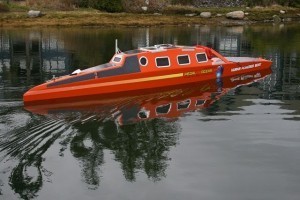
WiTHiN (photo by me)
But this intended voyage was something different – something altogether less predictable, where the most meticulous boat design and rigorous training regime could, and probably would, be thwarted by the vagaries of Mother Nature.
Self-knowledge, which I would guess had been sharpened by his countless hours of training and competing in solitude and exhaustion, led Greg to what was the right decision for him. He took the brave decision to cancel his voyage to Hawaii.
I hesitate to dwell on Greg’s disappointment rather than his many successes, and I hope he will forgive me for doing so, but I decided that there was an important point here – about being clear about who you are and what your goal is when you set out on any major endeavour.
Greg decided that he was athlete more than adventurer. Speaking personally, I came to the opposite conclusion about myself when I was seduced by a sponsor’s offer into attempting to break the women’s speed record for rowing the Atlantic, only to discover that even an additional £5,000 on the table still wasn’t enough to motivate me to row more than 12 hours a day. My goals were to prove something to myself about my powers of self-reliance, and to raise awareness of environmental issues. Trying to be something I wasn’t caused me a lot of stress, though, before I reached this epiphany.
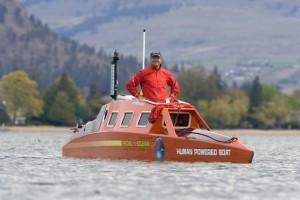
Some of that stunning Canadian scenery
So I offer this blog post to you with my unsolicited advice for the week: before setting out on an endeavour, know yourself well enough to be aware of what your core values are, and if you have teammates, be sure that they also know what your core values are and, ideally, share them.
Of course, it’s not absolutely necessary to figure this out in advance, as the journey will reveal your truth soon enough, but it might be less painful to have thought about it beforehand.
Greg came out with many words of wisdom in this podcast – here are a couple of my favourites:
“When I get into something it’s just 100%. I really enjoy the feeling of having a goal – even a really scary one, something that is so far out there that it’s just frightening to me – and I just enjoy the feeling of making steps toward that goal and eventually accomplishing it. It’s all about the journey… it’s such an amazing story.“
“I don’t believe in limits, for sure.”
To subscribe to the show via RSS or iTunes, please click on the appropriate button below.
Show Notes
3:40 (After the world’s longest introduction) Greg’s transition from entrepreneur to über-athlete
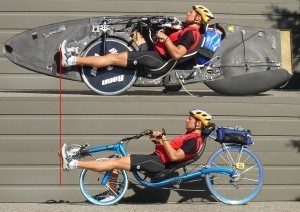
Designing the bicycle for the speed record
5:20 Why the ultra events? The joy of scary goals
6:45 What is it with Canadians and endurance?
7:50 Preparing for 24-hour human endurance record attempts – technical, physical and psychological
14:45 Pedal the Ocean project
16:15 The human element – even uber-athletes get seasick
18:00 A tough decision after sea trials in Ukluelet
25:00 How does Greg motivate people to embrace good new exercise habits?
29:20 Exercise: is it natural?
30:20 The cost of health care – both financial and social
32:55 Which of Greg’s achievements means the most to him?
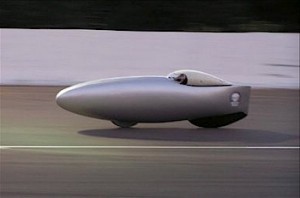
And the finished article – a bike like no other
34:00 37 hours on the Missouri this summer – link to race website
35:00 Training for racing – and solitude. The joy of audiobooks!
37:45 Handling setbacks and disappointments
41:15 Greg’s book recommendation: Ready Player One. To claim your free audiobook, please follow the Adventure Podcast affiliate link.
Links
Greg onstage at QV Calgary 2012
April 4, 2014
Adventure Podcast #29: Jo Royle, Plastiki Skipper and Oceans Advocate
Today’s guest has voyaged across oceans to raise awareness of plastic pollution. Sound familiar?
I first met Jo Royle when she was preparing to skipper the Plastiki – a boat made out of 12,500 reclaimed plastic bottles. (Just to clarify, this was not the JUNK Raft that I met up with on the Pacific, which was the cheap and cheerful version.) The Plastiki was an altogether more ambitious project, created by David de Rothschild, to showcase cradle to cradle design philosophies.
In 2010 they sailed the Plastiki from San Francisco to Sydney, taking 5 months. Since then Jo has continued passionately working for the environment.
Earth to Earth, Plastic to Plastic

Jo Royle
“[I became aware of] the interconnectedness of all the oceans and how our lifestyle choices are impacting them.” (Jo Royle)
It is fitting, maybe, that I am writing this blog post as I sit in the new Whole Foods Market store in Richmond, Surrey. I wonder how many of the shoppers in here, if any, think about the many places, plants, and animals that have been involved in the production of this cornucopia of food. Or where the plastic packaging, bottles, plastic-lined cans and tetrapaks will go after they are discarded.
We really need, urgently, to be more mindful about such things, and develop technologies and materials that will dramatically reduce our consumption and our wastage. So I applaud the Plastiki project and other forward-looking initiatives such as Dame Ellen MacArthur’s circular economy, that are seeking to promote a genuinely sustainable future.
And yet I still worry. We are a very, very long way away from these sustainable initiatives and technologies having any perceptible impact in the marketplace, while dramatically UNsustainable industries continue to increase in size and output.
I should know better than most that progress is not linear. Whether you’re a salesman, a parent, an athlete, a teacher or an ocean rower, you’ll probably know that feeling that you’re working hard but going nowhere. And then you’ll hit a sudden purple patch when the stars align and everything falls into place. And so I keep the faith, while still recognizing that hope is not a strategy.
We need to support these new concepts by voting with our wallets as ethical consumers (how I hate that word “consumers”!) and by enshrining principles of sustainability in our everyday lives.
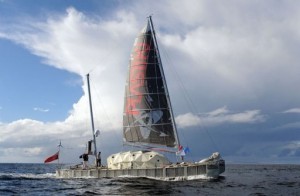
The Plastiki
If you want inspiration and ideas on how you can reduce your footprint, I highly recommend:
Finally, a challenge for you: can you think of a word that we can use as an alternative to “consumer” that will remind us that we can’t maintain our present linear patterns of consumption, but rather need to return to a sustainable position in the web of life?
“My life as a Trans ocean sailing skipper taught me about our intimate relationship with the sea and the barriers that have built between society and the natural world.” (Jo Royle)
To subscribe to the show via RSS or iTunes, please click on the appropriate button below.
Show Notes
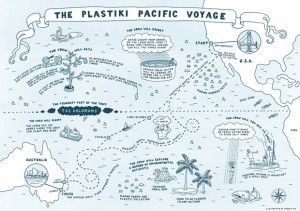
Voyage of the Plastiki
1:45 Jo’s early years as a sailor
2:30 The ocean, a lifelong teacher
3:25 Ocean adventuring and how Jo got involved with the Plastiki
4:30 Jo’s work with Pindar and Earthwatch to reduce environmental impact
7:30 [I diverted my career toward] understanding what is our relationship with nature and how can we live harmoniously with our natural environment and how can we make sure that our activities in the marine environment restore and help to create a resilient and a productive ocean rather than this take-take relationship that we have at the moment.
8:40 What does Jo love about the ocean? Simplicity, and living very presently – within your resources. Plus working with a team to achieve a shared goal.
11:30 The ocean: reality, or an escape from it?
13:00 Why do ocean storms always happen at night?!
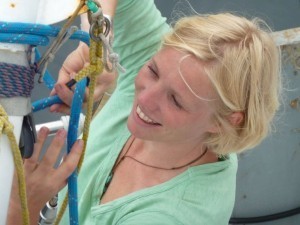
Jo in her element
14:20 The Plastiki: adventures in boat design to create the world’s first closed loop vessel
19:00 Introducing the merry crew of the Plastiki
22:30 The spirit of Plastiki – mastering a new design and new materials
26:00 The route of the Plastiki across the Pacific
27:35 The legacy of the Plastiki – corporate and public
29:30 Lessons to be learned for the environmental movement – including enabling local communities to protect their surroundings
31:15 What did Plastiki expedition mean to Jo?
32:00 Jo’s work with Common Seas
35:00 Audible.com book recommendation: The Wave. To claim your free audiobook, please follow the Adventure Podcast affiliate link.
Links
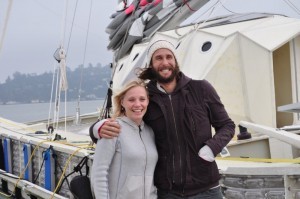
Jo with David de Rothschild
Common Seas (main website is down for maintenance – this link is to description of Common Seas on Jo’s website)
And a topical story on the missing Malaysian plane and trash in our oceans
March 27, 2014
Adventure Podcast #28: Reza Pakravan, Record-Breaking Cyclist
Reza was born in Iran. After retiring from semi-professional basketball 13 years ago, he has cycled the entire Annapurna Circuit in the Nepalese Himalayas and the full length of the Caspian Sea.
In 2011, Reza set the record for the fastest crossing of the Sahara on a bicycle, from Algeria to Sudan. It took him a little over 13 days to cover 1,084 miles.
When I first met Reza he was still working as a financial analyst in London, and preparing for his next big challenge. Last year he and his colleague Steve Pawley attempted to break the speed record for cycling 11,000 miles from Kapp to Cape, from Norway to South Africa, through 21 countries. Malaria, food poisoning, dehydration and cockroaches got in their way, but it still makes for an epic adventure.
Both expeditions were to raise money to build schools in Madagascar.
Comfort Kills Ambition
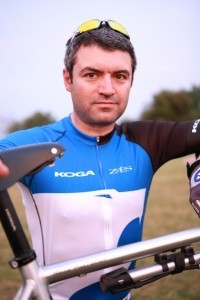
Reza Pakravan
“Taking risk and experiencing uncertainties is liberating. I absolutely love it. COMFORT KILLS AMBITION.” (Reza Pakravan)
One of the things I loved about this conversation with Reza was his willingness to leave behind the comfortable, corporate life and go out on a limb. He and I met up in a London pub a couple of nights ago, and he told me how, after he’d finished his Kapp to Cape expedition, he’d had a phone call from a former boss, inviting him back with a significant pay rise. And he had said NO.
That’s courage. And commitment to his new direction. Both of which I highly respect and commend.
I know how that feels. I know that stepping outside your comfort zone is, by definition, UNcomfortable for a while. Eventually you grow into the challenge, eventually your comfort zone expands so that what was initially uncomfortable becomes progressively MORE comfortable, but that interim period can be very uncomfortable indeed.
In my case as a rower, it was physically uncomfortable – seasickness, aching shoulders, painful saltwater sores, wet mouldy bed, water everywhere, in fact – AND psychologically uncomfortable – self-doubt, wondering what on earth had possessed me to take this on, feelings of inadequacy and depression.
Eventually I was able to step outside my little spiral of misery, to look at this period of time in the overall scheme of things, and realise that the short term pain is an essential part of the growth process.
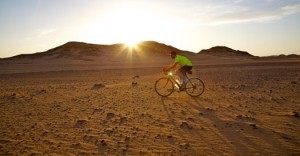
Cycling the Sahara
You know the feeling when you start a new job or a new, more responsible role, and it probably all seems rather challenging and difficult and yes, stressful. There’s a book called The Fifth Discipline: The Art & Practice of The Learning Organization , by Peter Senge, that explains this rather well.
, by Peter Senge, that explains this rather well.
It’s what Reza went through in order to live his dream – malaria, food poisoning, exhaustion – and in a strange echo of that, it’s what he is probably going through again right now, as he commits to the life of an adventurer.
When you have a vision of a goal, chances are that there is a gap between where you are now and where you want to be. Imagine a rubber band stretched between those two points – where you are now and where you want to be. There’s tension on that rubber band. This tension can be a source of energy, because if there was no gap, there would be no need to do anything to move towards your goal.
But what does tension seek? It seeks resolution or release. There are only two possible ways for the tension to release itself: pull reality toward the vision or pull the vision toward reality. Which are we going to choose?
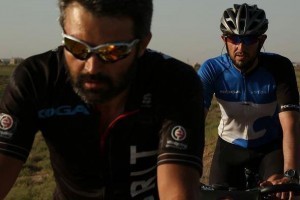
Creative tension
Although the answer might seem obvious, the problem is that tension is uncomfortable. It often leads to feelings or emotions associated with anxiety, such as sadness, discouragement, hopelessness, or worry. It’s easy to confuse these ‘bad’ things with the ‘good’ thing that is creative tension. But these ‘bad’ emotions are not creative tension itself. They are emotional tension.
The danger is that if we don’t recognise the difference between emotional tension and creative tension, we may end up taking the easy way out. It’s easy to release emotional tension – all we have to do is adjust the end of the rubber band that is completely under our control at all times – the vision. The ‘bad’ feelings go away because we’ve reduced the tension on the rubber band. BUT, the price we’ve paid is abandoning what we really want, our vision. It takes a certain kind of strength to hang on in there, to hold true to the vision, and take the harder path of raising ourselves up towards the vision rather than lowering the vision towards ourselves.
“I am a dreamer with no limit to my dreams, but I am a realistic planner. I seek liberation by taking risks and overcoming unknown situations, weighing up the odds and then getting on with it. Questioning the impossible is what motivates me. Throughout my life I have explored and experimented, learned and made mistakes, been a seeker and a follower, succeeded and failed great challenges, but tried hard not to be a dead fish, because only dead fish swim with the current.” (Reza Pakravan)
To subscribe to the show via RSS or iTunes, please click on the appropriate button below.
Show Notes
2:20 Training for cycling across several continents while working 12 hours a day
4:00 Cyclist, or adventurer? Why the masochistic endeavours?
6:00 How to cycle the Sahara
8:50 The formidable logistics of cycling from Kapp to Cape
13:30 Going for the record
15:30 And NOT going for the record
18:00 Hundred Shmundred – who cares?!
20:50 Having the right bike and chain and gadgets for touring – top tips!
24:10 Route-planned or following the nose?
26:15 Africa – and overcoming preconceptions
31:00 Arriving into Cape Town
32:50 Reza’s charity
35:10 What next?
36:40 Staying in touch
37:00 A thank you to our sponsors, Audible.com, and Producer Vic’s book recommendation: a techno-thriller by Daniel Suarez, called Influx. To claim your free audiobook, please follow the Adventure Podcast affiliate link.
Links
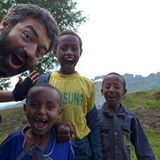
Getting to know Africa
Charity – schools in Madagascar





